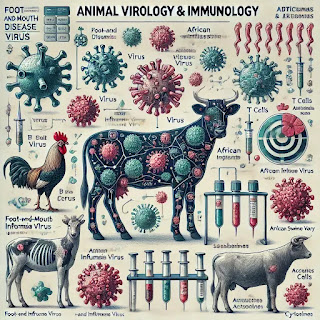"Animal Virology & Immunology: Viral Pathogenesis, Immune Defense, and Advances in Veterinary Medicine" #sciencefather#researchawards#AnimalVirology#VeterinaryImmunology#ZoonoticDiseases#VeterinaryVaccines#LivestockHealth#OneHealth#VeterinaryScience
Animal Virology & Immunology
1. Introduction to Animal Virology & Immunology
Animal virology is the study of viruses that infect animals, their replication mechanisms, pathogenesis, and transmission. It plays a crucial role in veterinary medicine, zoonotic disease control, and vaccine development. Animal immunology focuses on the immune response of animals to infections, vaccines, and immunotherapies, providing insights into disease prevention and treatment.
Understanding animal virology and immunology is essential for combating viral outbreaks, protecting livestock health, preventing zoonotic spillovers, and ensuring food security.
2. Major Animal Viruses & Their Impact
Animal viruses can be categorized based on their genome type (DNA or RNA viruses) and the species they infect. Some key viruses include:
🦠 Foot-and-Mouth Disease Virus (FMDV) – Affects cattle, pigs, and sheep, causing economic losses.
🦠 Avian Influenza Virus (AIV) – Highly contagious in poultry; some strains (e.g., H5N1, H7N9) can infect humans.
🦠 African Swine Fever Virus (ASFV) – A deadly disease in pigs with no effective vaccine.
🦠 Rabies Virus – A fatal zoonotic virus affecting mammals, including dogs and wildlife.
🦠 Newcastle Disease Virus (NDV) – Affects poultry, causing respiratory and neurological issues.
🦠 Porcine Reproductive and Respiratory Syndrome Virus (PRRSV) – Affects pigs, leading to reproductive failure and respiratory illness.
🦠 Bovine Viral Diarrhea Virus (BVDV) – Causes immunosuppression and reproductive issues in cattle.
🦠 Canine Parvovirus (CPV) – A severe viral disease affecting dogs, especially puppies.
3. Immune Response in Animals
The animal immune system defends against viral infections through innate and adaptive immunity:
🔹 Innate Immunity – The first line of defense, including barriers (skin, mucosa), phagocytes, and interferons.
🔹 Adaptive Immunity – Involves B cells (antibody production) and T cells (cell-mediated immunity).
🔹 Cytokines & Interferons – Proteins that regulate immune responses and inhibit viral replication.
🔹 Mucosal Immunity – Crucial in protecting against respiratory and gastrointestinal viruses.
4. Diagnostic Techniques in Animal Virology
🔬 Polymerase Chain Reaction (PCR) – Detects viral DNA/RNA with high accuracy.
🔬 Enzyme-Linked Immunosorbent Assay (ELISA) – Identifies viral antigens and antibodies in serum.
🔬 Virus Isolation & Culture – Growing viruses in cell cultures for study.
🔬 Next-Generation Sequencing (NGS) – Identifies novel and emerging viruses.
🔬 Serological Tests – Detects immune responses to viral infections.
5. Vaccines & Immunotherapy in Veterinary Medicine
💉 Live Attenuated Vaccines – Weakened viruses that provide strong immunity (e.g., Newcastle disease vaccine).
💉 Inactivated Vaccines – Killed viruses, safe but may require boosters (e.g., rabies vaccine).
💉 Recombinant Vaccines – Genetically engineered vaccines for precise immune response (e.g., FMDV vaccines).
💉 mRNA Vaccines – An emerging technology for rapid vaccine development.
💉 Monoclonal Antibodies – Used for targeted virus neutralization and treatment.
6. Zoonotic Viruses & One Health Approach
Many animal viruses can jump to humans (zoonoses), making virology crucial for public health. Examples include:
- Coronavirus (SARS-CoV, MERS-CoV, SARS-CoV-2) – Originated in animals and caused global pandemics.
- Influenza A Virus (H5N1, H1N1, H7N9) – Spreads from birds to humans.
- Rabies Virus – 100% fatal in humans if untreated.
- Ebola & Marburg Viruses – Spill over from bats to primates and humans.
The One Health approach integrates human, animal, and environmental health to prevent zoonotic spillovers.
7. Emerging Trends in Animal Virology & Immunology
🚀 AI & Machine Learning in Virology – Predicting viral outbreaks and vaccine efficacy.
🚀 CRISPR-Based Antiviral Strategies – Precision gene editing to fight viral infections.
🚀 Nanotechnology in Vaccine Delivery – Enhancing immune response through nano-vaccines.
🚀 Synthetic Biology for Virus Control – Engineering antiviral peptides and genetic resistance.
🚀 Microbiome & Immunity Research – Exploring gut microbiota's role in immune modulation.
See more info : http://
Nomination Link : https://
SOCIAL MEDIA
Facebook : https://www.facebook.com/
Twitter : https://x.com/DiyaLyra34020
Tumblr : https://www.tumblr.com/blog/
Blogger: https://www.blogger.com/u/1/
Linked in : https://www.linkedin.com/in/
Pinterest : https://in.pinterest.com/
#sciencefather#researchawards#

Comments
Post a Comment